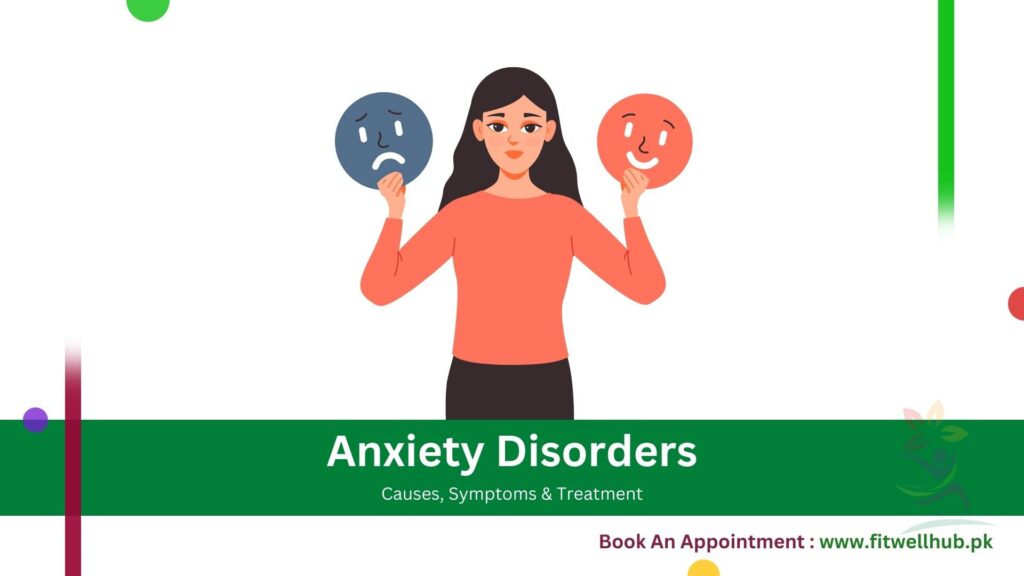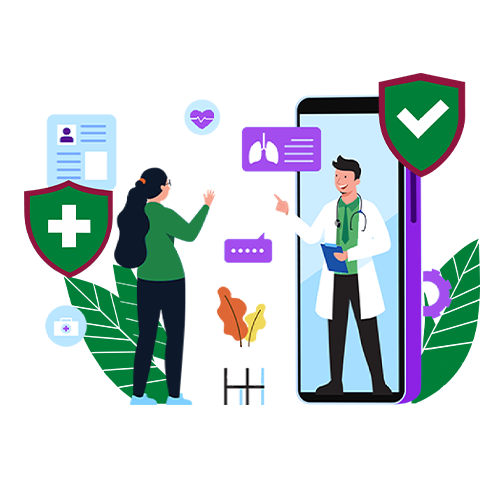Anxiety disorders are a class of mental health diseases characterized as constant and severe feelings of nervousness, fear, or worry that disturb the daily routine. In contrast with common anxiety experienced by everyone, anxiety disorders last for longer periods, and individuals frequently find their fears and worries disproportionate to the current situations. Anxiety disorders can be detected by physical symptoms like dizziness, sweating, and rapid heartbeat, as well as emotional symptoms such as difficulty concentrating, restlessness, and irritability.
Quick Links
ToggleSeveral types of anxiety disorders are specific phobias, social anxiety disorders, panic disorder, and generalized anxiety disorder (GAD). While these types have distinct characteristics, all can cause distress and negatively affect a person’s life. Treatment approaches such as lifestyle changes, medications, and therapies can assist people in managing their symptoms and controlling reoccurrence. Early diagnosis can also help prevent the disorder from worsening.
Symptoms
Anxiety disorders may present a range of emotional and physical symptoms. Typically, individuals experience persistent worry, fear, or panic, often without a clear cause.
- Excessive worry or fear: This is the major symptom of anxiety disorders in which people feel extensive worry about common routine challenges, even ones that other people might not find alarming.
- Restlessness or feeling on edge: Most individuals with anxiety disorders experience a constant feeling of tension or unease, and it will become difficult for people to relax.
- Rapid heart rate or palpitations: Physical symptoms like palpitation or racing heart can occur, frequently mistaken for other health diseases, including heart problems.
- Shortness of breath: During intense anxiety attacks, people may find it hard to breathe or feel like they are out of breath.
- Muscle tension: Persistent worry can cause physical symptoms such as muscle tension, particularly in the shoulders and neck.
- Difficulty concentrating: Anxiety frequently disturbs cognitive processes, making it difficult to think clearly or focus on tasks.
- Sleep disturbances: Many individuals with anxiety disorders often experience insomnia, which is characterized by difficulty falling asleep or waking up commonly during the night.
GET IN TOUCH
Book An Appointment
When to See a Doctor
When you observe feelings of anxiety that become persistent or overwhelming and disrupt the life routine, you must seek medical attention from a healthcare professional. Anxiety disorders may be worsened if not treated on time, causing other physical or mental health issues.
FitwellHub offers the services of a panel of highly skilled mental health doctors and provides personalized treatment plans, such as medications and therapy, to assist in managing anxiety disorders. Take the first step towards a stress-free life and book your appointment at FitwellHub.
Causes
Several causes and risk factors may contribute to developing anxiety disorders, as there is no single cause of it.
1- Genetic predisposition
People with a family history of anxiety disorders are at a higher risk of developing similar conditions, indicating a genetic component.
2- Environmental stress
Life events like family conflicts, work stress, and financial problems can cause anxiety disorders, particularly if they involve chronic stress.
3- Brain chemistry imbalance
Neurotransmitter imbalances, including dopamine and serotonin, contribute significantly to the development of anxiety disorders.
4- Trauma or abuse
Anxiety can arise from past experiences of psychological, physical, or emotional trauma, sometimes years after the incident.
5- Chronic medical conditions
Health problems like diabetes or heart disease can increase the risk of anxiety, especially if they are highly concerned about their physical health.
6- Substance abuse
The use of drugs or alcohol may lead to anxiety or worsen existing anxiety disorders.
7- Personality traits
Individuals with certain personality aspects, such as high sensitivity or perfectionism, are at higher risk of anxiety disorder development.
Risk Factors
Various factors can raise the chances of anxiety disorder development. Here are some of the major risk factors:
- Family history of anxiety disorders: If one or more members of your family have anxiety, your risk of developing a similar condition arises because of genetic links.
- Stressful life situations: Past life events such as financial struggle, job loss, or divorce can cause ongoing stress, leading to anxiety disorders.
- Childhood trauma: People who were abused or went through other types of child trauma are more susceptible to anxiety disorders in later life.
- Chronic illness: Diseases such as depression or heart disease can increase the chances of anxiety disorder.
- Substance abuse: Use of drugs or alcohol for a long time can cause anxiety or worsen the existing symptoms.
- Gender: Women are more likely to develop anxiety disorders, as societal stressors or hormonal differences can lead to increased rates of anxiety disorders among them.
The prevalence rate of anxiety disorder is 45.5% among females and just 21.7% among men in Pakistan, which is a serious gender disparity.
Complications
Anxiety disorders can cause several complications if left untreated. It can affect a person’s physical as well as mental condition. Here are a few complications given:
- Depression: Anxiety disorders often occur with depression, which further complicates the treatment process by worsening the mental health condition.
- Social isolation: People with anxiety disorder can have a fear of judgment or embarrassment; therefore, they tend to avoid social interaction, which can result in loneliness.
- Substance abuse: Some patients with anxiety disorders may turn to drugs or alcohol as a coping method, resulting in addiction.
- Chronic pain: The anxiety disorder can cause physical symptoms that involve prolonged pain conditions such as muscle tension and headache.
- Sleep disorders: Anxiety generally leads to or worsens sleep issues like insomnia, leading to negative side effects on mental and physical well-being.
- Poor quality of life: Chronic anxiety may lower a person’s ability to enjoy life’s events. It can impact a person’s relationships, employment, and everyday activities.
Prevention
Anxiety disorders can be prevented through healthy lifestyle changes and effective stress management. Here are some preventive tips:
- Regular physical activity: Daily exercise can prevent anxiety naturally as it regulates stress and releases endorphins.
- A healthy diet and proper sleep: Good sleeping habits and a healthy diet are the most important aspects that help stabilize mood and regulate energy levels to decrease anxiety.
- Stress management techniques: Practicing techniques like yoga, deep breathing, or meditation can significantly reduce stress levels.
- Avoiding alcohol: Prevention of alcohol use can reduce the chances of anxiety disorder development.
- Seeking therapy or counseling when needed: Early detection and treatment through an effective approach can prevent anxiety from becoming a complete disorder.
FitwellHub provides the Elite Healthy Lifestyle Program to assist in preventing anxiety and ensuring mental well-being. To learn more, visit our program here.
Diagnosis
A complete assessment, such as a physical check-up and psychological evaluation can diagnose anxiety disorders. Below, we discuss tests used to detect anxiety disorders:
- Psychological evaluation: A mental health doctor conducts a psychological assessment by holding a detailed session with the patient to examine the intensity and type of anxiety.
- Blood tests: Doctors use blood tests to detect other medical conditions, such as thyroid problems, that can cause anxiety symptoms.
- Heart tests: Doctors may perform heart tests like ECGs to identify the heart-related triggers of anxiety symptoms such as palpitations.
- Sleep studies: A healthcare professional may recommend studying sleeping habits to detect problems, especially in individuals with serious sleep disorders.
- Neuroimaging: Doctors may perform brain scans to detect neurological disorders or structural problems.
FitwellHub offers multiple advanced diagnostic services and assists in identifying anxiety disorders and other related mental health disorders. Take charge of your well-being today and schedule an appointment through our Labs.
Treatment
Some of the effective treatment approaches are given below:
- Cognitive behavioral therapy (CBT): This type of treatment assists patients in recognizing and changing negative thought processes that can lead to anxiety.
- Medications: Medications, like anti-anxiety drugs or antidepressants, are commonly used in treatment and can help manage the symptoms of anxiety disorders.
- Lifestyle changes: A healthy diet, proper sleep, and regular exercise can decrease anxiety.
- Mindfulness and relaxation techniques: Techniques such as breathing exercises, meditation, or mindfulness can be applied to manage anxiety and assist in relaxing the mind.
Pakistan spends only 0.4% of its health budget on mental health, highlighting a dark gap in resource usage to address anxiety and other psychological disorders.
Medications
Medications are generally used along with therapies to treat anxiety disorders. The main medications used are:
- Selective serotonin reuptake inhibitors (SSRIs): Such medications help to manage neurotransmitters, decreasing anxiety symptoms with time.
- Benzodiazepines: These medicines are used for short-term relief, as they can lead to addiction and help with sudden symptoms.
- Beta-blockers: Beta-blockers treat physical symptoms such as trembling and rapid heart rate, especially during situations that can trigger anxiety.
FitwellHub’s pharmacy provides a range of medicines to assist in managing anxiety disorders. Order your medicines today through our Pharmacy.
GET IN TOUCH
Book An Appointment
Frequently Asked Questions (FAQ’s)
Therapy (CBT), medications (SSRIs), lifestyle changes, and relaxation techniques help manage anxiety.
Muscle tension, shortness of breath, rapid heart rate, excessive worry, and restlessness.
Yes, an individual with a family history of anxiety disorders is more susceptible to anxiety disorder development.
Anxiety may result in emotional symptoms such as irritability and physical symptoms such as headaches, affecting quality of life.
Therapy (CBT), medications (SSRIs), lifestyle changes, and relaxation techniques help manage anxiety.
Although anxiety can’t be cured permanently all the time, an effective treatment approach can significantly decrease and manage symptoms.
A balanced diet, stress management methods, proper sleep, and regular exercise can decrease anxiety.














